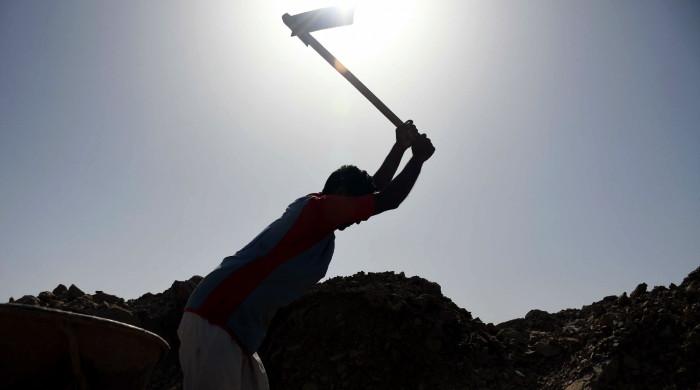Labour Day: A Legacy of Struggle and Unfulfilled Promises
The rights we recognize today as fundamental were once hard-won battles fought by courageous workers. Labour Day stands as a testament to their enduring legacy. This day acknowledges both the hardships faced and the gains achieved during the labor movement, which gained significant momentum following the Haymarket Affair in Chicago.
The movement’s genesis can be traced back to a nationwide general strike on May 1, 1886, when over 300,000 workers, including a substantial contingent in Chicago, protested against exploitation and demanded an eight-hour workday. However, tragedy struck days later on May 4 at Haymarket Square when a bomb exploded during a smaller protest, resulting in immense casualties and marking a turning point in the fight for workers’ rights.
Labour Day serves as a reminder of the immense sacrifices made in the protracted struggle for equitable compensation, secure workplaces, and fundamental rights. Pakistan, in line with numerous other nations, observes this day to uphold the principles of labor dignity and protect these rights. Yet, despite office closures and online tributes, many workers continue toiling in silence, facing low wages, inadequate protection, and a lack of representation. Ironically, while celebrating labour, we often fall short in championing its rights.
To gain insights into the present realities, representatives from various labor organizations throughout Pakistan shared their perspectives.
Challenges and Concerns
Chaudhry Saad, General Secretary of the Pakistan United Workers Federation (PUWF), highlighted a variety of pressing issues. He stated that minimum wage laws are not consistently enforced, and the implementation of social security measures remains inadequate. Furthermore, the promised benefits under the Basic Worker Welfare Fund Act often face delays of 10 to 15 years.
Safety Violations
Saad emphasized a continuous disregard for safety protocols, questioning the consistent adherence to safety measures among construction workers, noting the blatant disregard for safety regulations.
Limited Union Representation
Despite workers’ right to form unions under the Punjab Industrial Relations Act (PIRA), only a small fraction of the workforce is unionized. Saad also highlighted the lack of full implementation of laws. He noted the requirement for appointment letters and gratuity under the Industrial Relations Act (IRA), which are frequently not provided.
Judicial Delays
Saad expressed concerns regarding the slow judicial system, stating that it leads to prolonged suffering for workers as their cases linger in courts.
Chaudhry Yaqoob, Chairman of the Muttahida Labour Federation (MTF), concurred with these concerns, emphasizing the inadequate enforcement of labor laws and the rarity of gratuity payments.
Registration Issues
Yaqoob highlighted that despite legal requirements, the majority of workers are not registered with Social Security and EOBI (Employees’ Old-Age Benefits Institution).
Unfair Termination Practices
He also explained that employers often bypass the legal process for terminating workers, neglecting to provide show-cause notices or conduct hearings.
Obstacles to Union Formation
Employers frequently establish sham unions to obstruct the formation of genuine unions, making it difficult for workers to demonstrate the required membership support.
Vulnerable Women Workers
Yaqoob emphasized the difficult conditions faced by women workers, who often struggle to make ends meet, earning meager wages.
Rabia Razzaque, Senior Programme Officer at the International Labour Organization (ILO), addressed gaps in wage implementation and governance.
Supply Chain Complexities
Razzaque emphasized that governance quality varies across levels, as the main company often does not directly oversee contractors or subcontractors.
Suppression of Union Rights
She raised concerns about retaliation against union organizers, highlighting the routine suppression of workers’ rights to form and join trade unions, guaranteed by both IRA and ILO conventions.
Weak Enforcement
<
Fear, intimidation, and dismissals discourage workers from organizing, leading to cases in labor courts and reflecting a crisis of weak enforcement.
Proposed Solutions and the Way Forward
Saad advocated for direct worker representation in Parliament to ensure meaningful change and effective implementation of labor laws.
Political Will
He stressed the importance of political will and the government’s ability to act decisively when motivated.
Yaqoob emphasized the necessity of labor inspections to ensure compliance, but noted their current ineffectiveness and the need for genuine representation of workers’ voices.
Razzaque outlined the ILO’s efforts to support enforcement through social dialogue and compliance frameworks, including transparent record-keeping and pathways for worker growth.
Digitization and Compliance Plans
She acknowledged improvements resulting from the digitization of labor inspections in Punjab and the ILO’s work with labor departments in other provinces to develop tailored compliance plans.
Comprehensive Solutions
Razzaque warned that the labor market’s problems were complex and required comprehensive solutions, including state intervention to build worker capacity and raise awareness about rights, starting from school education.
On this Labour Day, it’s crucial to look beyond symbolic gestures and consider the struggles of those who form the foundation of the economy. We must remember the security guard working long hours for low pay, the bonded labourers in brick kilns, the garment workers without contracts, and the construction workers without proper safety equipment. The well-being of workers is essential for the stability of society as a whole.



Comments (0)
No comments yet. Be the first to comment!
Leave a Comment